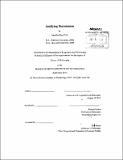| dc.contributor.advisor | Richard Holton. | en_US |
| dc.contributor.author | Carr, Jennifer Rose | en_US |
| dc.contributor.other | Massachusetts Institute of Technology. Department of Linguistics and Philosophy. | en_US |
| dc.date.accessioned | 2014-01-23T18:42:42Z | |
| dc.date.available | 2014-01-23T18:42:42Z | |
| dc.date.issued | 2013 | en_US |
| dc.identifier.uri | http://hdl.handle.net/1721.1/84415 | |
| dc.description | Thesis (Ph. D.)--Massachusetts Institute of Technology, Dept. of Linguistics and Philosophy, 2013. | en_US |
| dc.description | Cataloged from PDF version of thesis. | en_US |
| dc.description | Includes bibliographical references (pages 97-100). | en_US |
| dc.description.abstract | Bayesianism, in its traditional form, consists of two claims about rational credences. According to the first claim, probabilism, rational credences form a probability function. According to the second claim, conditionalization, rational credences update by conditionalizing on new evidence. The simplicity and elegance of classical Bayesianism make it an attractive view. But many have argued that this simplicity comes at a cost: that it requires too many idealizations. This thesis aims to provide a justification of classical Bayesianism. Chapter One defends probabilism, classically understood, against the charge that by requiring credences to be precise real numbers, classical Bayesianism is committed to an overly precise conception of evidence. Chapter Two defends conditionalization, classically understood, against the charge that epistemic rationality consists only of synchronic norms. Chapter Three defends both probabilism and conditionalization against the objection that they require us, in some circumstances, to have credences that we can know are not as close to the truth as alternatives that violate Bayesian norms. | en_US |
| dc.description.statementofresponsibility | by Jennifer Rose Carr. | en_US |
| dc.format.extent | 100 pages | en_US |
| dc.language.iso | eng | en_US |
| dc.publisher | Massachusetts Institute of Technology | en_US |
| dc.rights | M.I.T. theses are protected by
copyright. They may be viewed from this source for any purpose, but
reproduction or distribution in any format is prohibited without written
permission. See provided URL for inquiries about permission. | en_US |
| dc.rights.uri | http://dspace.mit.edu/handle/1721.1/7582 | en_US |
| dc.subject | Linguistics and Philosophy. | en_US |
| dc.title | Justifying Bayesianism | en_US |
| dc.type | Thesis | en_US |
| dc.description.degree | Ph.D. | en_US |
| dc.contributor.department | Massachusetts Institute of Technology. Department of Linguistics and Philosophy | |
| dc.identifier.oclc | 868024606 | en_US |
